University Employability Skills: An Annotated Bibliography
VerifiedAdded on 2020/03/23
|7
|1639
|40
Annotated Bibliography
AI Summary
This annotated bibliography presents concise summaries of five research articles focusing on graduate employability. Finch et al. (2016) explore dynamic capabilities in employability, drawing parallels between organizational strategies and student career development. Gbadamosi et al. (2015) investigate the impact of part-time work, self-efficacy, and career aspirations on UK students. Jackson (2014) examines undergraduate competence in employability skills, highlighting gaps in non-technical skills. Lim (2015) discusses integrating academic assessment with employer expectations, emphasizing transferable skills. Wilton (2011) analyzes the importance of employability skills in the UK graduate labor market, focusing on business and management graduates. Each summary provides the author's main arguments, research methods, key findings, and limitations, offering a comprehensive overview of the current research landscape in employability.

Running head: ANNOTATED BIBLIOGRAPHY
Annotated Bibliography
Student’s name:
Name of the university:
Author’s note:
Annotated Bibliography
Student’s name:
Name of the university:
Author’s note:
Paraphrase This Document
Need a fresh take? Get an instant paraphrase of this document with our AI Paraphraser
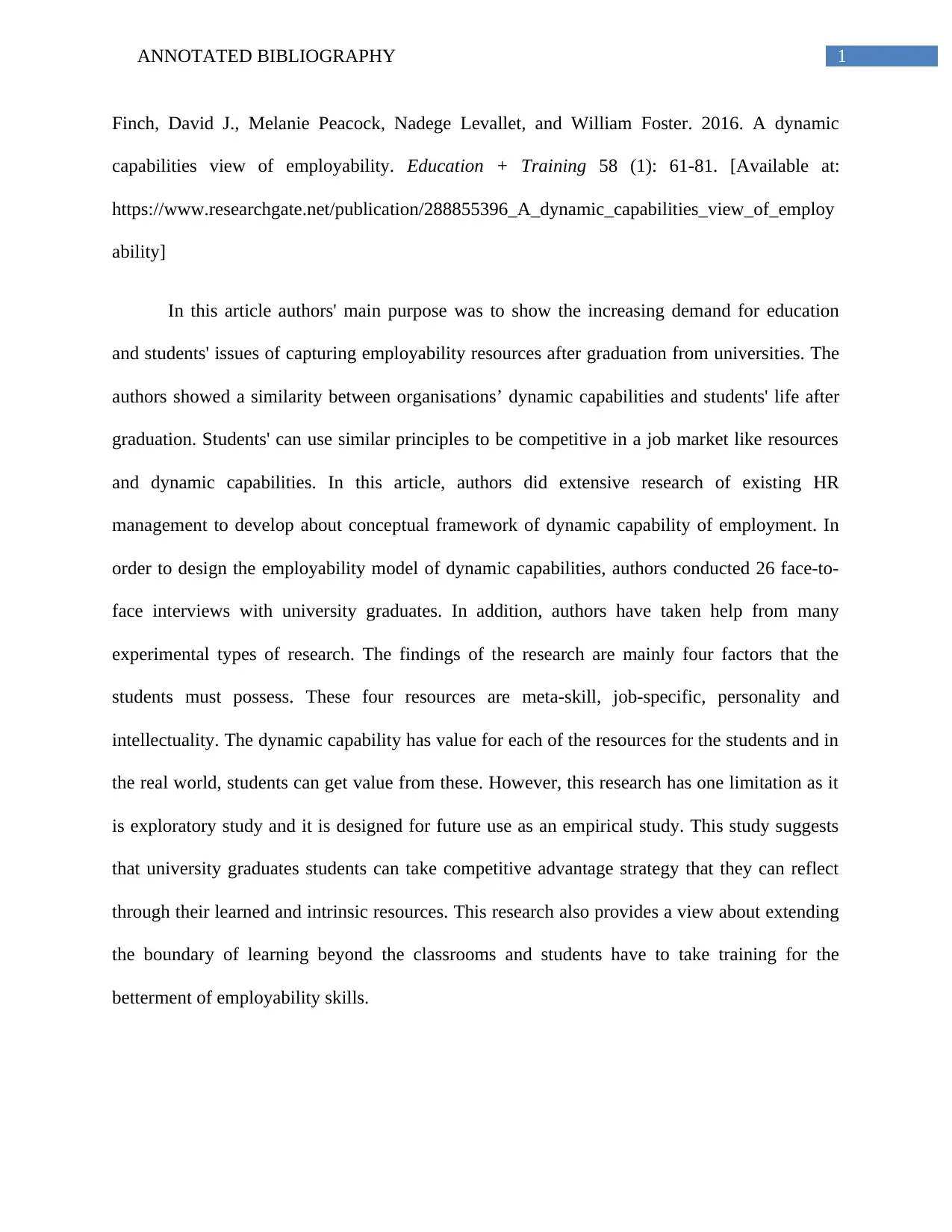
1ANNOTATED BIBLIOGRAPHY
Finch, David J., Melanie Peacock, Nadege Levallet, and William Foster. 2016. A dynamic
capabilities view of employability. Education + Training 58 (1): 61-81. [Available at:
https://www.researchgate.net/publication/288855396_A_dynamic_capabilities_view_of_employ
ability]
In this article authors' main purpose was to show the increasing demand for education
and students' issues of capturing employability resources after graduation from universities. The
authors showed a similarity between organisations’ dynamic capabilities and students' life after
graduation. Students' can use similar principles to be competitive in a job market like resources
and dynamic capabilities. In this article, authors did extensive research of existing HR
management to develop about conceptual framework of dynamic capability of employment. In
order to design the employability model of dynamic capabilities, authors conducted 26 face-to-
face interviews with university graduates. In addition, authors have taken help from many
experimental types of research. The findings of the research are mainly four factors that the
students must possess. These four resources are meta-skill, job-specific, personality and
intellectuality. The dynamic capability has value for each of the resources for the students and in
the real world, students can get value from these. However, this research has one limitation as it
is exploratory study and it is designed for future use as an empirical study. This study suggests
that university graduates students can take competitive advantage strategy that they can reflect
through their learned and intrinsic resources. This research also provides a view about extending
the boundary of learning beyond the classrooms and students have to take training for the
betterment of employability skills.
Finch, David J., Melanie Peacock, Nadege Levallet, and William Foster. 2016. A dynamic
capabilities view of employability. Education + Training 58 (1): 61-81. [Available at:
https://www.researchgate.net/publication/288855396_A_dynamic_capabilities_view_of_employ
ability]
In this article authors' main purpose was to show the increasing demand for education
and students' issues of capturing employability resources after graduation from universities. The
authors showed a similarity between organisations’ dynamic capabilities and students' life after
graduation. Students' can use similar principles to be competitive in a job market like resources
and dynamic capabilities. In this article, authors did extensive research of existing HR
management to develop about conceptual framework of dynamic capability of employment. In
order to design the employability model of dynamic capabilities, authors conducted 26 face-to-
face interviews with university graduates. In addition, authors have taken help from many
experimental types of research. The findings of the research are mainly four factors that the
students must possess. These four resources are meta-skill, job-specific, personality and
intellectuality. The dynamic capability has value for each of the resources for the students and in
the real world, students can get value from these. However, this research has one limitation as it
is exploratory study and it is designed for future use as an empirical study. This study suggests
that university graduates students can take competitive advantage strategy that they can reflect
through their learned and intrinsic resources. This research also provides a view about extending
the boundary of learning beyond the classrooms and students have to take training for the
betterment of employability skills.
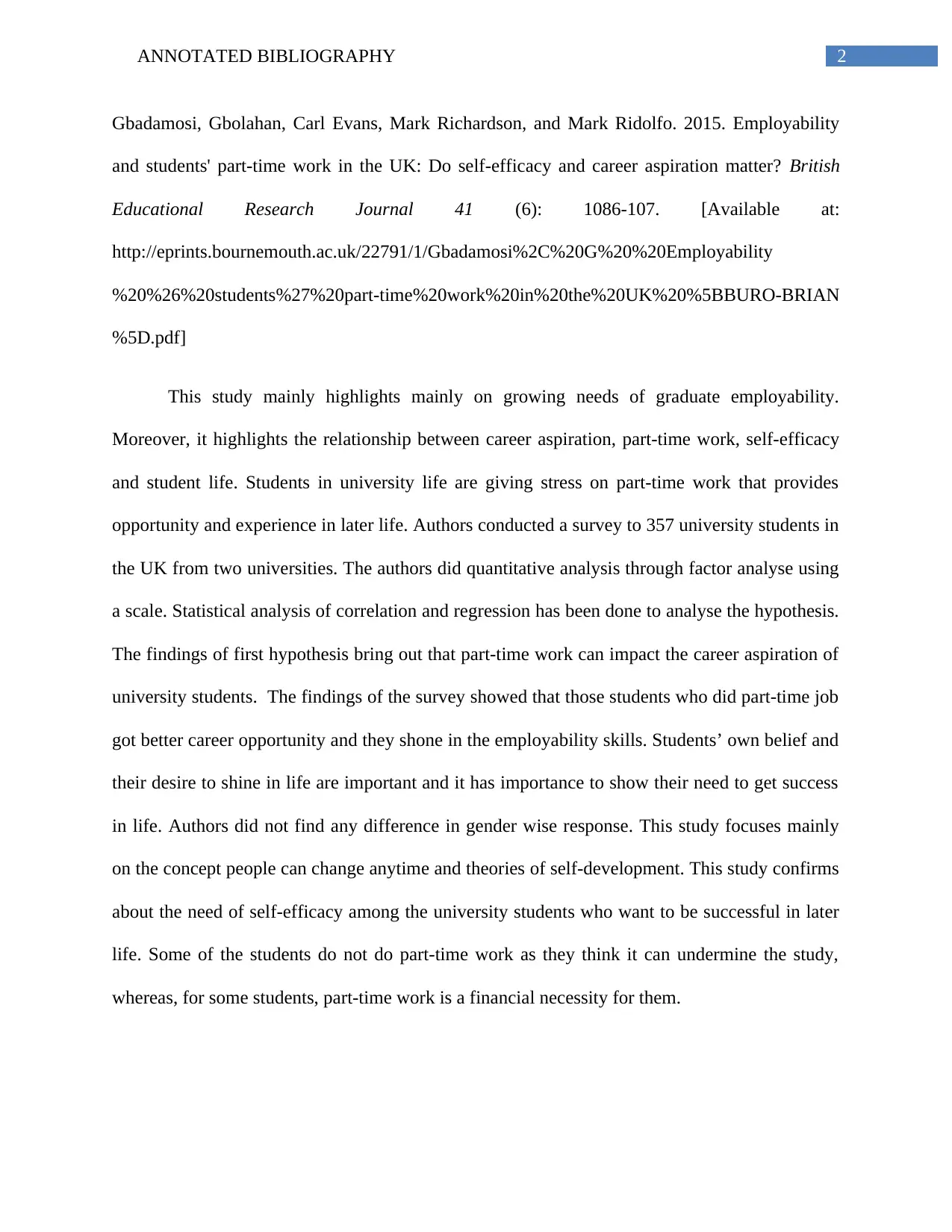
2ANNOTATED BIBLIOGRAPHY
Gbadamosi, Gbolahan, Carl Evans, Mark Richardson, and Mark Ridolfo. 2015. Employability
and students' part‐time work in the UK: Do self‐efficacy and career aspiration matter? British
Educational Research Journal 41 (6): 1086-107. [Available at:
http://eprints.bournemouth.ac.uk/22791/1/Gbadamosi%2C%20G%20%20Employability
%20%26%20students%27%20part-time%20work%20in%20the%20UK%20%5BBURO-BRIAN
%5D.pdf]
This study mainly highlights mainly on growing needs of graduate employability.
Moreover, it highlights the relationship between career aspiration, part-time work, self-efficacy
and student life. Students in university life are giving stress on part-time work that provides
opportunity and experience in later life. Authors conducted a survey to 357 university students in
the UK from two universities. The authors did quantitative analysis through factor analyse using
a scale. Statistical analysis of correlation and regression has been done to analyse the hypothesis.
The findings of first hypothesis bring out that part-time work can impact the career aspiration of
university students. The findings of the survey showed that those students who did part-time job
got better career opportunity and they shone in the employability skills. Students’ own belief and
their desire to shine in life are important and it has importance to show their need to get success
in life. Authors did not find any difference in gender wise response. This study focuses mainly
on the concept people can change anytime and theories of self-development. This study confirms
about the need of self-efficacy among the university students who want to be successful in later
life. Some of the students do not do part-time work as they think it can undermine the study,
whereas, for some students, part-time work is a financial necessity for them.
Gbadamosi, Gbolahan, Carl Evans, Mark Richardson, and Mark Ridolfo. 2015. Employability
and students' part‐time work in the UK: Do self‐efficacy and career aspiration matter? British
Educational Research Journal 41 (6): 1086-107. [Available at:
http://eprints.bournemouth.ac.uk/22791/1/Gbadamosi%2C%20G%20%20Employability
%20%26%20students%27%20part-time%20work%20in%20the%20UK%20%5BBURO-BRIAN
%5D.pdf]
This study mainly highlights mainly on growing needs of graduate employability.
Moreover, it highlights the relationship between career aspiration, part-time work, self-efficacy
and student life. Students in university life are giving stress on part-time work that provides
opportunity and experience in later life. Authors conducted a survey to 357 university students in
the UK from two universities. The authors did quantitative analysis through factor analyse using
a scale. Statistical analysis of correlation and regression has been done to analyse the hypothesis.
The findings of first hypothesis bring out that part-time work can impact the career aspiration of
university students. The findings of the survey showed that those students who did part-time job
got better career opportunity and they shone in the employability skills. Students’ own belief and
their desire to shine in life are important and it has importance to show their need to get success
in life. Authors did not find any difference in gender wise response. This study focuses mainly
on the concept people can change anytime and theories of self-development. This study confirms
about the need of self-efficacy among the university students who want to be successful in later
life. Some of the students do not do part-time work as they think it can undermine the study,
whereas, for some students, part-time work is a financial necessity for them.
⊘ This is a preview!⊘
Do you want full access?
Subscribe today to unlock all pages.

Trusted by 1+ million students worldwide
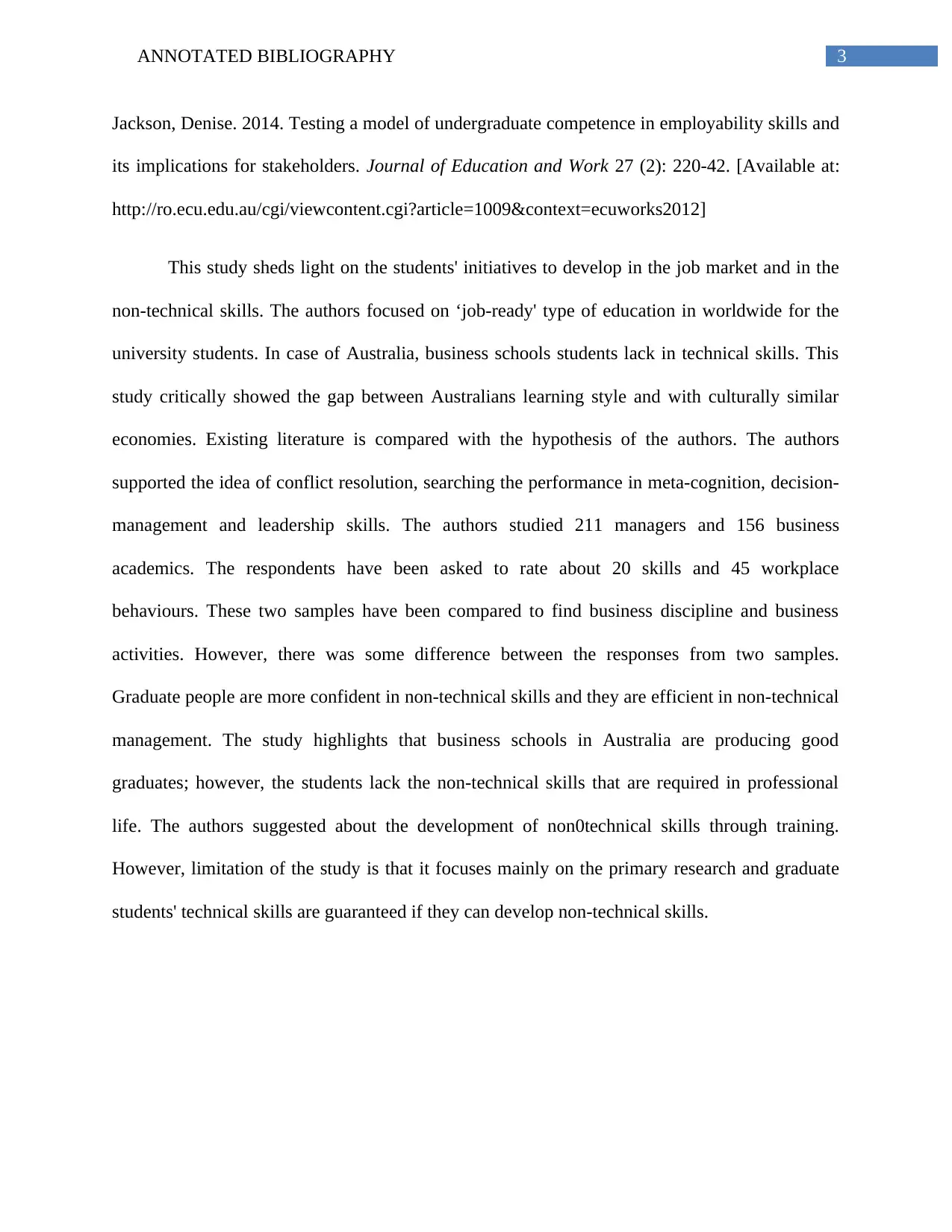
3ANNOTATED BIBLIOGRAPHY
Jackson, Denise. 2014. Testing a model of undergraduate competence in employability skills and
its implications for stakeholders. Journal of Education and Work 27 (2): 220-42. [Available at:
http://ro.ecu.edu.au/cgi/viewcontent.cgi?article=1009&context=ecuworks2012]
This study sheds light on the students' initiatives to develop in the job market and in the
non-technical skills. The authors focused on ‘job-ready' type of education in worldwide for the
university students. In case of Australia, business schools students lack in technical skills. This
study critically showed the gap between Australians learning style and with culturally similar
economies. Existing literature is compared with the hypothesis of the authors. The authors
supported the idea of conflict resolution, searching the performance in meta-cognition, decision-
management and leadership skills. The authors studied 211 managers and 156 business
academics. The respondents have been asked to rate about 20 skills and 45 workplace
behaviours. These two samples have been compared to find business discipline and business
activities. However, there was some difference between the responses from two samples.
Graduate people are more confident in non-technical skills and they are efficient in non-technical
management. The study highlights that business schools in Australia are producing good
graduates; however, the students lack the non-technical skills that are required in professional
life. The authors suggested about the development of non0technical skills through training.
However, limitation of the study is that it focuses mainly on the primary research and graduate
students' technical skills are guaranteed if they can develop non-technical skills.
Jackson, Denise. 2014. Testing a model of undergraduate competence in employability skills and
its implications for stakeholders. Journal of Education and Work 27 (2): 220-42. [Available at:
http://ro.ecu.edu.au/cgi/viewcontent.cgi?article=1009&context=ecuworks2012]
This study sheds light on the students' initiatives to develop in the job market and in the
non-technical skills. The authors focused on ‘job-ready' type of education in worldwide for the
university students. In case of Australia, business schools students lack in technical skills. This
study critically showed the gap between Australians learning style and with culturally similar
economies. Existing literature is compared with the hypothesis of the authors. The authors
supported the idea of conflict resolution, searching the performance in meta-cognition, decision-
management and leadership skills. The authors studied 211 managers and 156 business
academics. The respondents have been asked to rate about 20 skills and 45 workplace
behaviours. These two samples have been compared to find business discipline and business
activities. However, there was some difference between the responses from two samples.
Graduate people are more confident in non-technical skills and they are efficient in non-technical
management. The study highlights that business schools in Australia are producing good
graduates; however, the students lack the non-technical skills that are required in professional
life. The authors suggested about the development of non0technical skills through training.
However, limitation of the study is that it focuses mainly on the primary research and graduate
students' technical skills are guaranteed if they can develop non-technical skills.
Paraphrase This Document
Need a fresh take? Get an instant paraphrase of this document with our AI Paraphraser
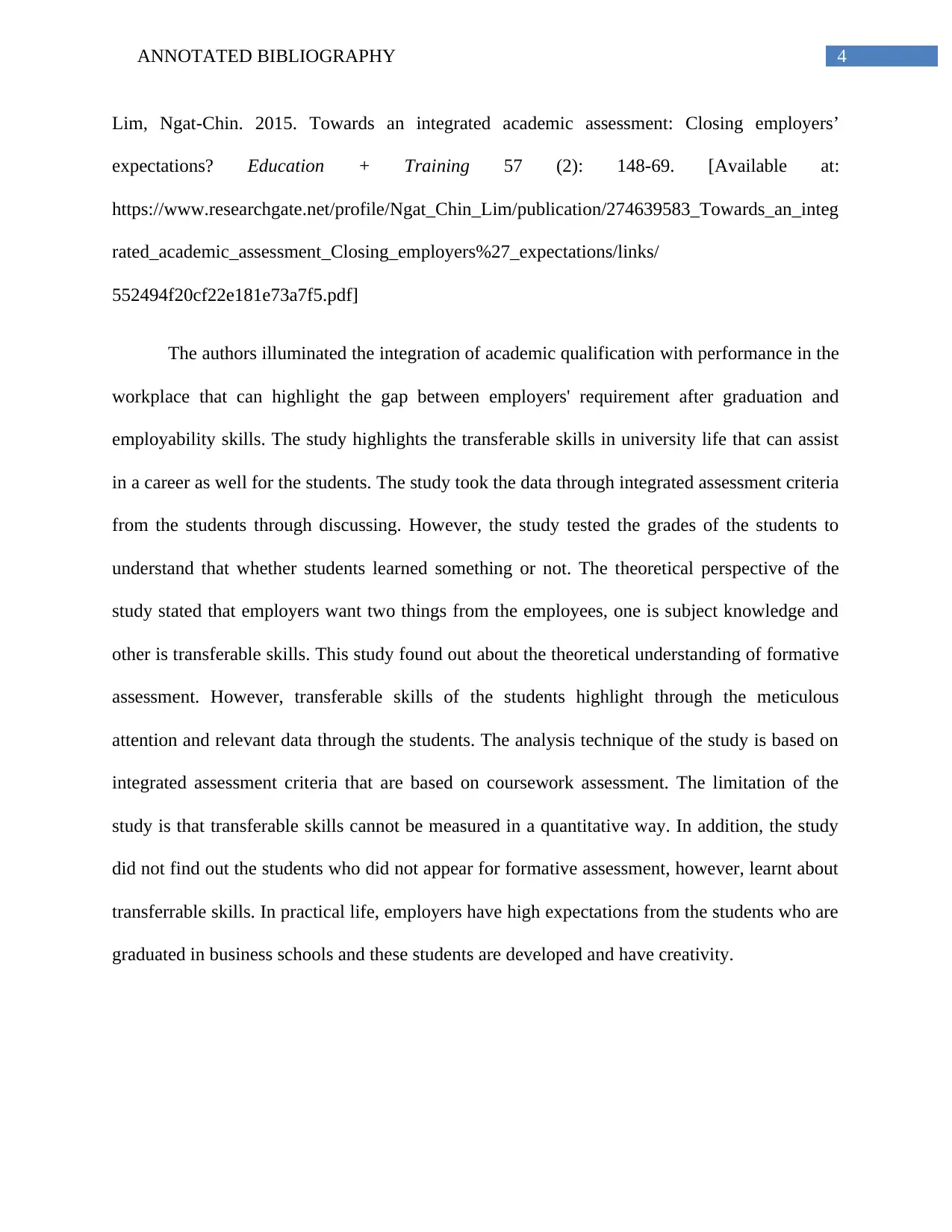
4ANNOTATED BIBLIOGRAPHY
Lim, Ngat-Chin. 2015. Towards an integrated academic assessment: Closing employers’
expectations? Education + Training 57 (2): 148-69. [Available at:
https://www.researchgate.net/profile/Ngat_Chin_Lim/publication/274639583_Towards_an_integ
rated_academic_assessment_Closing_employers%27_expectations/links/
552494f20cf22e181e73a7f5.pdf]
The authors illuminated the integration of academic qualification with performance in the
workplace that can highlight the gap between employers' requirement after graduation and
employability skills. The study highlights the transferable skills in university life that can assist
in a career as well for the students. The study took the data through integrated assessment criteria
from the students through discussing. However, the study tested the grades of the students to
understand that whether students learned something or not. The theoretical perspective of the
study stated that employers want two things from the employees, one is subject knowledge and
other is transferable skills. This study found out about the theoretical understanding of formative
assessment. However, transferable skills of the students highlight through the meticulous
attention and relevant data through the students. The analysis technique of the study is based on
integrated assessment criteria that are based on coursework assessment. The limitation of the
study is that transferable skills cannot be measured in a quantitative way. In addition, the study
did not find out the students who did not appear for formative assessment, however, learnt about
transferrable skills. In practical life, employers have high expectations from the students who are
graduated in business schools and these students are developed and have creativity.
Lim, Ngat-Chin. 2015. Towards an integrated academic assessment: Closing employers’
expectations? Education + Training 57 (2): 148-69. [Available at:
https://www.researchgate.net/profile/Ngat_Chin_Lim/publication/274639583_Towards_an_integ
rated_academic_assessment_Closing_employers%27_expectations/links/
552494f20cf22e181e73a7f5.pdf]
The authors illuminated the integration of academic qualification with performance in the
workplace that can highlight the gap between employers' requirement after graduation and
employability skills. The study highlights the transferable skills in university life that can assist
in a career as well for the students. The study took the data through integrated assessment criteria
from the students through discussing. However, the study tested the grades of the students to
understand that whether students learned something or not. The theoretical perspective of the
study stated that employers want two things from the employees, one is subject knowledge and
other is transferable skills. This study found out about the theoretical understanding of formative
assessment. However, transferable skills of the students highlight through the meticulous
attention and relevant data through the students. The analysis technique of the study is based on
integrated assessment criteria that are based on coursework assessment. The limitation of the
study is that transferable skills cannot be measured in a quantitative way. In addition, the study
did not find out the students who did not appear for formative assessment, however, learnt about
transferrable skills. In practical life, employers have high expectations from the students who are
graduated in business schools and these students are developed and have creativity.
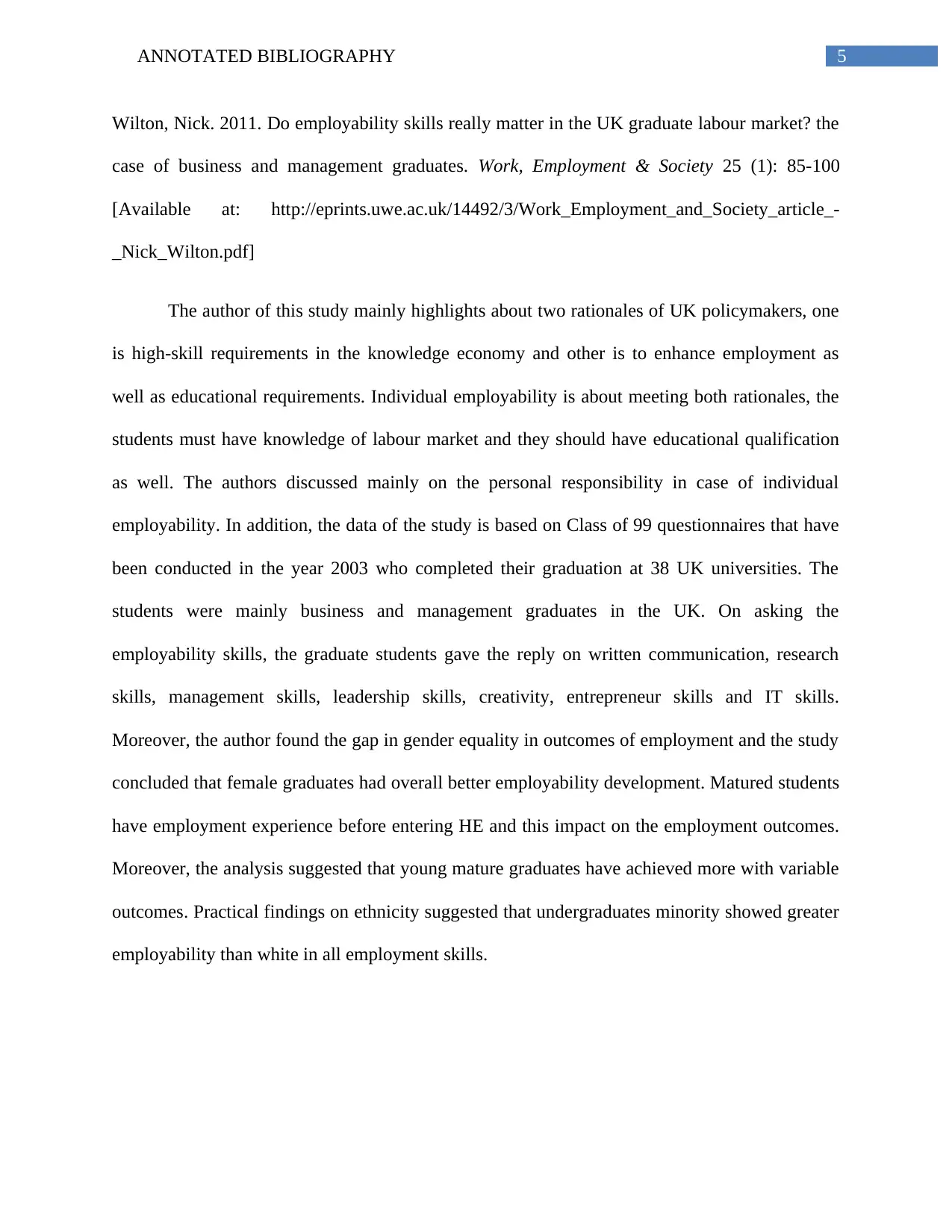
5ANNOTATED BIBLIOGRAPHY
Wilton, Nick. 2011. Do employability skills really matter in the UK graduate labour market? the
case of business and management graduates. Work, Employment & Society 25 (1): 85-100
[Available at: http://eprints.uwe.ac.uk/14492/3/Work_Employment_and_Society_article_-
_Nick_Wilton.pdf]
The author of this study mainly highlights about two rationales of UK policymakers, one
is high-skill requirements in the knowledge economy and other is to enhance employment as
well as educational requirements. Individual employability is about meeting both rationales, the
students must have knowledge of labour market and they should have educational qualification
as well. The authors discussed mainly on the personal responsibility in case of individual
employability. In addition, the data of the study is based on Class of 99 questionnaires that have
been conducted in the year 2003 who completed their graduation at 38 UK universities. The
students were mainly business and management graduates in the UK. On asking the
employability skills, the graduate students gave the reply on written communication, research
skills, management skills, leadership skills, creativity, entrepreneur skills and IT skills.
Moreover, the author found the gap in gender equality in outcomes of employment and the study
concluded that female graduates had overall better employability development. Matured students
have employment experience before entering HE and this impact on the employment outcomes.
Moreover, the analysis suggested that young mature graduates have achieved more with variable
outcomes. Practical findings on ethnicity suggested that undergraduates minority showed greater
employability than white in all employment skills.
Wilton, Nick. 2011. Do employability skills really matter in the UK graduate labour market? the
case of business and management graduates. Work, Employment & Society 25 (1): 85-100
[Available at: http://eprints.uwe.ac.uk/14492/3/Work_Employment_and_Society_article_-
_Nick_Wilton.pdf]
The author of this study mainly highlights about two rationales of UK policymakers, one
is high-skill requirements in the knowledge economy and other is to enhance employment as
well as educational requirements. Individual employability is about meeting both rationales, the
students must have knowledge of labour market and they should have educational qualification
as well. The authors discussed mainly on the personal responsibility in case of individual
employability. In addition, the data of the study is based on Class of 99 questionnaires that have
been conducted in the year 2003 who completed their graduation at 38 UK universities. The
students were mainly business and management graduates in the UK. On asking the
employability skills, the graduate students gave the reply on written communication, research
skills, management skills, leadership skills, creativity, entrepreneur skills and IT skills.
Moreover, the author found the gap in gender equality in outcomes of employment and the study
concluded that female graduates had overall better employability development. Matured students
have employment experience before entering HE and this impact on the employment outcomes.
Moreover, the analysis suggested that young mature graduates have achieved more with variable
outcomes. Practical findings on ethnicity suggested that undergraduates minority showed greater
employability than white in all employment skills.
⊘ This is a preview!⊘
Do you want full access?
Subscribe today to unlock all pages.

Trusted by 1+ million students worldwide
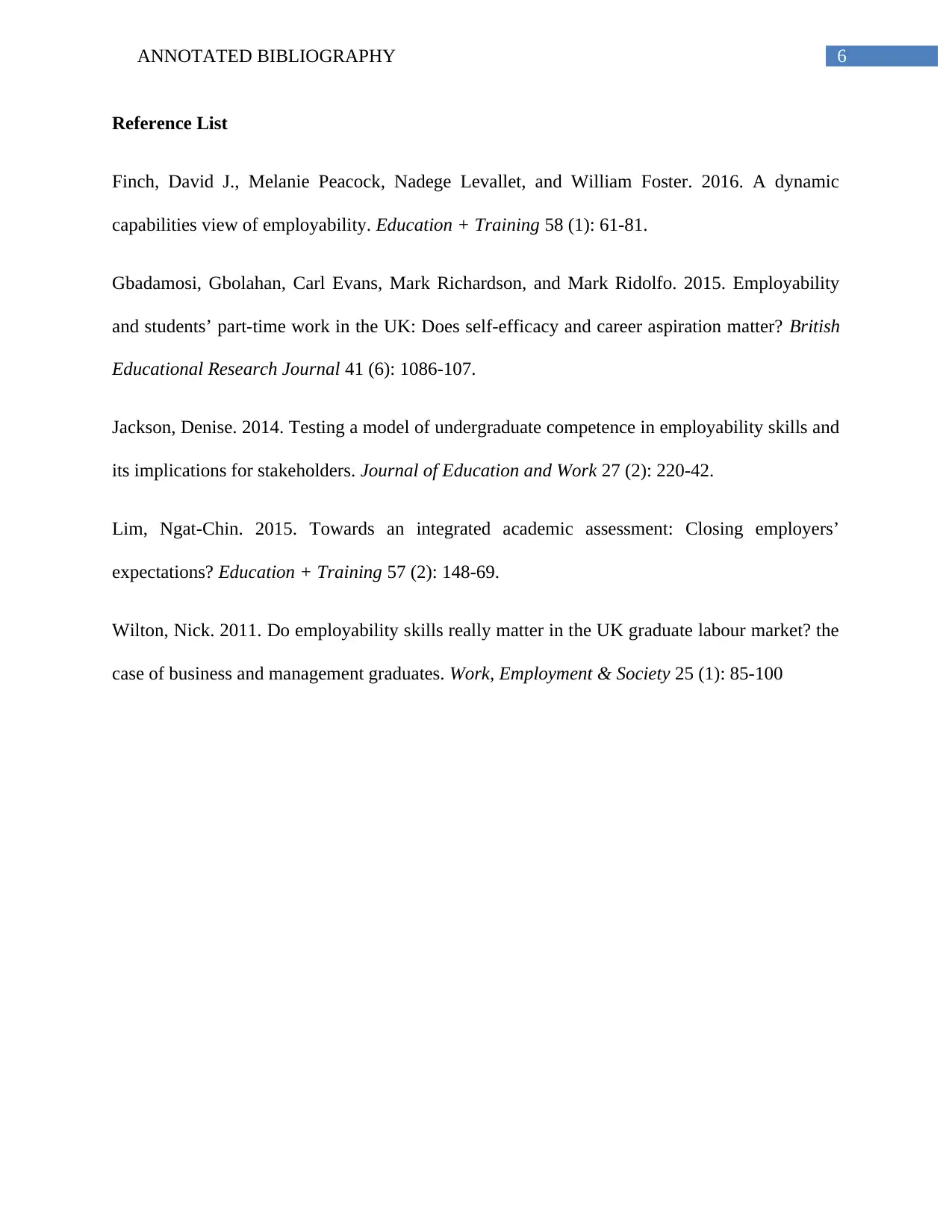
6ANNOTATED BIBLIOGRAPHY
Reference List
Finch, David J., Melanie Peacock, Nadege Levallet, and William Foster. 2016. A dynamic
capabilities view of employability. Education + Training 58 (1): 61-81.
Gbadamosi, Gbolahan, Carl Evans, Mark Richardson, and Mark Ridolfo. 2015. Employability
and students’ part‐time work in the UK: Does self‐efficacy and career aspiration matter? British
Educational Research Journal 41 (6): 1086-107.
Jackson, Denise. 2014. Testing a model of undergraduate competence in employability skills and
its implications for stakeholders. Journal of Education and Work 27 (2): 220-42.
Lim, Ngat-Chin. 2015. Towards an integrated academic assessment: Closing employers’
expectations? Education + Training 57 (2): 148-69.
Wilton, Nick. 2011. Do employability skills really matter in the UK graduate labour market? the
case of business and management graduates. Work, Employment & Society 25 (1): 85-100
Reference List
Finch, David J., Melanie Peacock, Nadege Levallet, and William Foster. 2016. A dynamic
capabilities view of employability. Education + Training 58 (1): 61-81.
Gbadamosi, Gbolahan, Carl Evans, Mark Richardson, and Mark Ridolfo. 2015. Employability
and students’ part‐time work in the UK: Does self‐efficacy and career aspiration matter? British
Educational Research Journal 41 (6): 1086-107.
Jackson, Denise. 2014. Testing a model of undergraduate competence in employability skills and
its implications for stakeholders. Journal of Education and Work 27 (2): 220-42.
Lim, Ngat-Chin. 2015. Towards an integrated academic assessment: Closing employers’
expectations? Education + Training 57 (2): 148-69.
Wilton, Nick. 2011. Do employability skills really matter in the UK graduate labour market? the
case of business and management graduates. Work, Employment & Society 25 (1): 85-100
1 out of 7
Related Documents
Your All-in-One AI-Powered Toolkit for Academic Success.
+13062052269
info@desklib.com
Available 24*7 on WhatsApp / Email
![[object Object]](/_next/static/media/star-bottom.7253800d.svg)
Unlock your academic potential
Copyright © 2020–2026 A2Z Services. All Rights Reserved. Developed and managed by ZUCOL.





